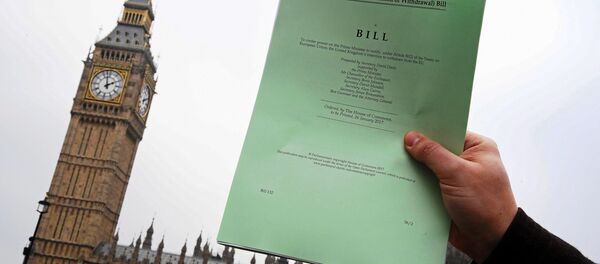With May primed to pull the trigger on Article 50 March 29, EEF, the the trade body for UK manufacturers, has issued a report, titled UK Trade with the EU: a New Trading Order, concluding that simply walking away from the negotiating table, if a favorable deal isn't reached, would be a "lose-lose" outcome for both the UK and the EU.
CEO @EEF_TScuoler shares why 'no deal is a no go' for #ukmfg when it comes to #Brexit https://t.co/anSM5QZeUP pic.twitter.com/EorcFRHLd9
— EEF Insights (@EEF_Insights) March 27, 2017
Noting the EU remains the manufacturing industry's single biggest trading partner, UK manufacturing employs around three million people and the country ranks ninth largest in the world in terms of industry, the authors assert that by removing the fundamental building blocks of the relationship — the customs union and single market — the government is consigning the sector to "a costly and difficult" future.
Losing either would leave manufacturing businesses exposed from day one, and if no agreement between Britain and the EU is reached, the sector could face World Trade Organization (WTO) tariffs of over percent percent on exports to the continent.
Coming to you screens in 2019 a special one off "Deal or No Deal — The future of Britain" hosted by Theresa May and the Brexiteers. #Brexit pic.twitter.com/NMji0DsIc9
— Red Moon (@Undercover_mole) March 26, 2017
"Any suggestion that 'no deal is better than a bad deal' is simply unacceptable to an industry that accounts for 45 percent of all UK exports, and would undoubtedly hurt our industry and condemn us to a painful and costly Brexit. The idea of walking away empty-handed might be a negotiating tactic, but would deliver a risky and expensive blow. The rhetoric from the UK government needs to focus instead on achieving a deal that will work for the UK and the EU," the report said.
If the UK was to secede from the EU with no deal in place, the EEF caution it would immediately mean the total loss of zero rate tariffs, high WTO tariffs on imports, including component parts from the EU; everything to higher WTO tariffs for exports to the EU and trading partners under current EU FTAs. For manufacturing, average tariffs for exports to the EU would increase to approximately 5.3%.
However this masks significant tariffs for certain products such as automotive goods; potentially higher WTO tariffs on imports, including component parts from the EU, changes to and potential loss of inwards processing relief, changes to customs warehousing arrangements, new non-tariff barriers in the form of customs documentation and checks and administration in the levying of tariffs, having to meet non-preferential rules of origin for exports to the EU, higher compliance costs for any changed EU standards and loss of preferential arrangements with third countries under current EU free trade agreements.
As a result, EEF urges close consultation between government and industry while negotiations between the EU and UK are ongoing — as Brexit will be the "most complex unraveling" any UK government has or will ever likely undertake, the government "will need the help of industry to identify, understand and mitigate the implications."
Moreover, EEF want the UK to achieve full membership of the WTO prior to leaving, and commit to a transition period that will allow firms to adapt to changes on a phased basis. Furthermore, it wants Britain to retain key European trading conditions, such as harmonized product standards.
Nonetheless, the group believes leaving the EU represents a "unique opportunity" to strike trade agreements with other countries, and reshape industrial strategy to get the UK economy "firing on all cylinders."
May's "deal or no deal" proposal has proved extremely controversial and unpopular with the UK public since it was outlined in January.
A March opinion poll found twice as many people would rather the UK stayed in the EU, with only 25 percent backing her proposed nuclear option — conversely, 27 percent said May must negotiate a deal, 14 percent said the UK should stay in the EU on new terms, and 15 percent said the country should stay on existing terms. In total, 56 percent favor options at odds with the Prime Minister's plan.
Despite being at odds with May over her plans, the BMG survey found 38 percent of the public did approve of the way the Prime Minister has handled Brexit, with 33 percent disapproving and 29 percent unsure.
Opinion was less oblique when people were asked whether they felt the Brexit negotiations would have a positive or a negative impact on the British economy. Some 43 percent said the impact would be bad, of which 14 percent thought it would be "very bad." Meanwhile, 33 percent thought it would be good, with seven percent thinking it would be "very good." Just under a quarter (24 percent) believed there would be no impact.






